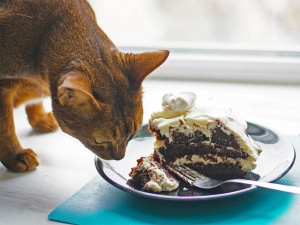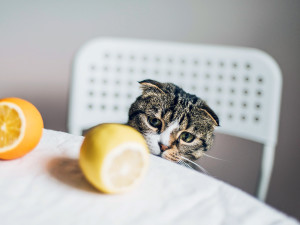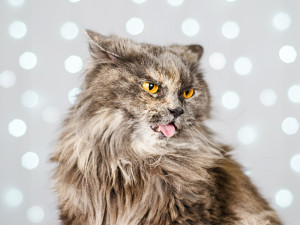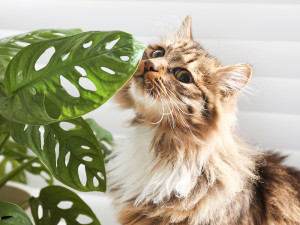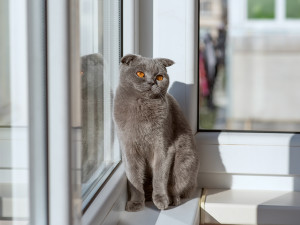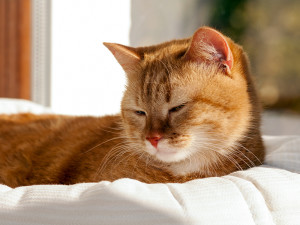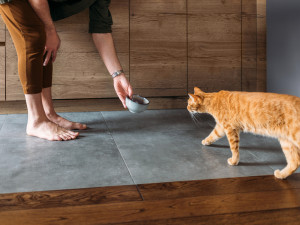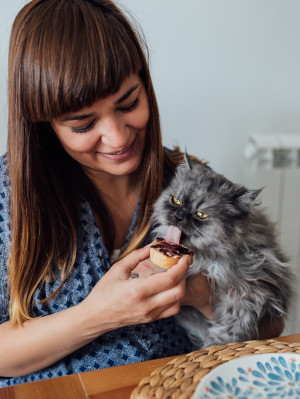Top 10 Foods That Are Toxic to Cats
Sharing isn’t always caring. Keep your cat safe by keeping these human snack staples to yourself.
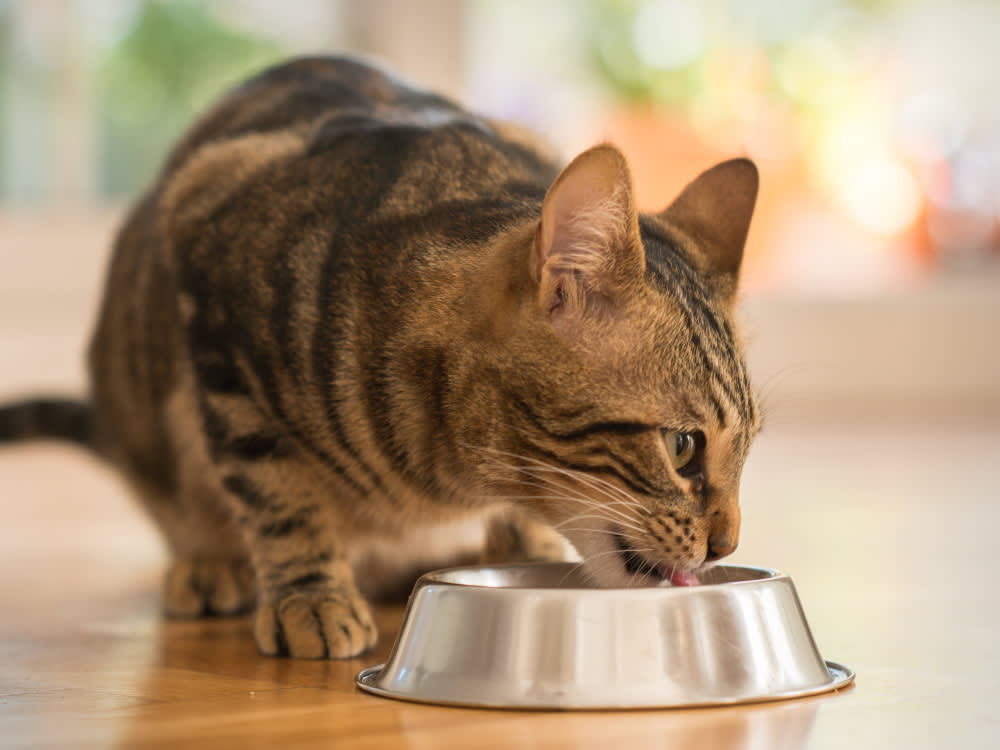
Share Article
In This Article:
What Makes a Food Toxic? List of Toxic Foods Foods You Should Never Feed Your Cat What to Do If Your Cat Has Consumed Something Toxic Signs of Toxicity in Cats Commonly Asked Questions
Certain foods can be toxic to cats, and pet parents should be vigilant to prevent accidental ingestion. Examples of toxic foods for cats include chocolate, onions, garlic, and grapes, all of which can lead to severe health issues or even be fatal.
What makes a food toxic to cats?
It’s often hard to know why some foods are safe for people but not for our cats. Certain foods pose risks, as they may contain chemical substances, high-oil content, or sharp edges that can result in problems with a cat’s organs, blood cells, or gastrointestinal tract. Cats are usually pickier than dogs about what they put in their mouths, but some don’t hesitate to chow down on anything that looks like it may be good.

List of toxic foods for cats
It’s impossible to list every food that is toxic to cats because ingredients that are toxic to cats (like raisins) pop up in so many recipes. In general, it’s best to keep them away from foods that contain things like:
Chocolate
Grapes, raisins, sultanas, or currants
Lots of butter or oil
Alcohol
Caffeine
Spices
Bones
Citrus zest
10 foods you should never feed your cat
Your cat might have nine lives, but you don’t want to risk them by feeding their voracious appetite without caution. Human foods are one of the top pet toxins. Here, veterinarian Dr. Tina Wismer, who is the senior director of toxicology for the ASPCA Animal Poison Control Center, shares 10 human foods that cats should never eat.
1. Alcohol
Your kitty may act drunk after consuming alcohol, but lack of coordination and drowsiness are not the sole risks: Alcohol is toxic to cats and can lead to tremors, rapid heartbeat, seizures, loss of consciousness, and even death. Ethanol poisoning is possible even when cats drink small amounts of alcohol.
2. Caffeine
Cats are sensitive to the caffeine in things like coffee, tea, and energy drinks. It can upset their stomachs, causing vomiting and diarrhea. In large amounts, the stimulant can lead to caffeine toxicity, raising blood pressure and triggering an irregular heartbeat; it can also lead to loss of muscle control and seizures.
3. Chocolate
Chocolate contains substances called methylxanthines, notes Dr. Wismer. “Darker chocolate is more dangerous than milk chocolate,” she says. “White chocolate has the lowest level of methylxanthines, while baking chocolate contains the highest.”
Cats who eat chocolate can experience vomiting and diarrhea, panting, excessive thirst and urination, hyperactivity, abnormal heart rhythm, tremors, seizures, and even death. “Cats commonly sample chocolate, [but] they rarely ingest enough to cause more than mild [stomach upset],” Dr. Wismer adds. “This may be due to cats not having sweet taste buds.”
4. Grapes and raisins
You probably know that grapes and raisins are doggie-don’ts, but these foods should be off limits for cats, too. Like dogs, cats who eat grapes and raisins could develop kidney failure. In addition to avoiding the fruits, steer clear of all foods that could contain them, including grape juice, cookies, protein bars, breads, and other snacks that might have grapes and raisins as ingredients. Cousins of grapes and raisins, such ascurrants and sultanas, should stay off the kitty menu as well.
5. Milk
Children��’s picture books are wrong: Cats shouldn’t be given saucers of warm milk. In fact, they lack lactase, the enzyme needed to process dairy foods. This feline version of lactose intolerance can lead to upset stomach, gas, cramping, and diarrhea. Kittens who need to be bottle-fed should be offered specially formulated kitten formula — not cow’s milk, which lacks the nutrients they need to thrive.
6. Nuts
Walnuts, pecans, almonds, and other nuts contain high amounts of oils and fats. While this satiating combination isn’t toxic to cats, Dr. Wismer still suggests steering clear because the fats can cause vomiting and diarrhea. Cats should never be fed salted or chocolate-covered nuts. Macadamia nuts, which are highly toxic to dogs, cause no problems in cats, per Dr. Wismer.
7. Onions
The same ingredient that brings tears to your eyes can cause weakness, lethargy, loss of appetite, pale gums, and dark orange-red urine in your cat. Onions — as well as other plants in the Allium family, including shallots, scallions, leeks, and garlic — are linked to red blood cell damage and could lead to anemia. Often, it takes a few days for the symptoms to appear.
“Cats may initially vomit, but within three to five days they will become lethargic, may have pale gums, and you may notice red urine,” Dr. Wismer says. “This happens due to the destruction of the red blood cells and loss of oxygen carrying capacity.” Exposure to small quantities in onion powder or onion soup mix could be especially problematic because of the high concentration of onions.
8. Raw eggs
Raw eggs can be a source of E. coli or Salmonella. Both types of bacteria can cause illness ranging from dehydration and vomiting to fever. Skipping raw food in general will help to avoid spreading bacteria that can be harmful to your cat and your family.
9. Yeast
Store that sourdough starter in a safe place. Raw yeast, even in small amounts, is toxic. “When a cat ingests raw bread dough, the yeast continues to convert the sugars in the dough to carbon dioxide gas and alcohol,” Dr. Wismer says. “This can result in bloated, drunken pets [and] could become a life-threatening emergency.”
Although the raw yeast and dough are dangerous to cats, Dr. Wismer says it’s OK to break bread with your cat on occasion, adding, “Cooked bread is safe for cats to enjoy.”
10. Citrus
While the flesh of most citrus fruits is not harmful to cats, other parts of the fruit and plant contain oils that can cause digestive upset and other symptoms. Cats aren’t huge citrus fans anyway, so they’ll usually seek out something tastier to snack on.
What should I do if my cat has consumed something toxic?
If your curious cat managed to snatch something off your plate or countertop, don’t panic. Try to figure out (roughly) how much they ate, what was in it, and how long ago it happened. After you have some basic information, contact your veterinarian’s office or an animal poison control center for guidance. They can let you know what the potential dangers are and the next steps you should take.
Sometimes, you come home to find evidence of unapproved snacking and a sick cat. If your cat is showing any signs of problems, it’s best to just proceed directly to your vet’s office or the nearest veterinary emergency clinic for help.
What are the signs of toxicity in cats?
The signs of toxicity will depend on the food. Some common signs seen with food toxicities include:
Vomiting and diarrhea: Almost any dietary indiscretion can cause stomach upset, and this is often the first sign that something is causing a problem. You may see evidence of whatever was eaten in the piles of vomit your cat leaves around your house.
Lethargy: Cats with severe stomach upset, kidney issues, dehydration, or intoxication may show signs of lethargy. Alcohol, raw dough ingestion, grapes, or raisins are some of the common culprits that can cause lethargy.
Hyperactivity: Caffeinated food and drink and chocolate-containing snacks can cause restlessness, hyperactivity, and trembling. You’ll usually see vomiting before this, but cats don’t always follow the rules on how to show signs of toxicity.
FAQs (People also ask):
Should you feed your cat human food?
While it’s usually fine if your cat gets a little lick of what you’re eating, human foods should not make up a significant portion of their diet or snacks. Of course, you should avoid sharing anything with ingredients on the toxic foods list.
Is dog food toxic to cats?
Dog food is not toxic to cats, but it is not nutritionally complete for them. Cats eating dog food as a major source of nutrition will develop deficiencies in essential nutrients and can become very sick.
Is cat food toxic to dogs?
Cat food is not toxic to dogs, but it’s recommended to feed dogs foods that are made for them. Besides possibly getting some stomach upset, your dog is unlikely to suffer any ill effects from snatching some food from your cat’s bowl.
References:

Jodi Helmer
Jodi Helmer is a North Carolina-based freelance writer who shares her home with an embarrassing number of rescue dogs and relies on four feral cats to patrol the barn. When she isn’t refilling food and water dishes, Jodi writes about animals for Scientific American, Sierra, WebMD, AKC Family Dog, Living the Country Life, and Out Here.

Dr. Bartley Harrison, DVM
Dr. Bartley Harrison is a veterinarian with more than 19 years of experience. He has treated a variety of species in emergency and speciality practices for both large and small animals. His primary interests as a vet are emergency medicine and critical care.
Related articles
![cat sniffing a plant]()
Household Plants That Are Toxic to Cats
These plants might be beautiful, but they’re deadly to feline foragers.
![brown dog begging for food at table]()
Foods Your Dog Can’t Eat
Even if they aren’t too proud to beg, you shouldn’t let your pup in on these snacks.
![Uncomfortable looking gray cat sitting on a window sill]()
Should Your Cat Go to the ER?
Here are six good reasons to haul tail to the emergency room.
![Red cat with squinted eyes laying in a basket closeup]()
6 Ways Your Cat Could Tell You They Are in Pain
Here are all the way your kitty is trying to tell you they’re hurting.
![Profile view of a man giving a cat food to eat]()
Why Is My Cat Not Eating? Causes, Symptoms, and Treatment
A veterinary nutritionist explains why your cat isn’t eating and how to increase their appetite.
![Woman feeding her puffy cat at the table.]()
What Human Foods Can Cats Eat?
We know they’re begging—but what’s safe to share?

